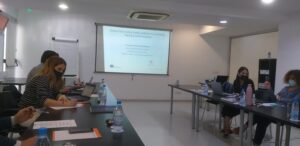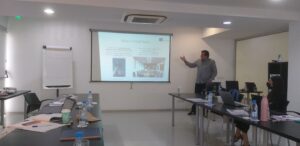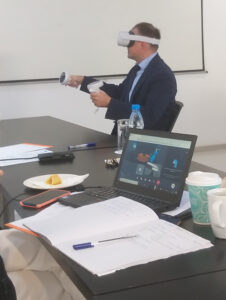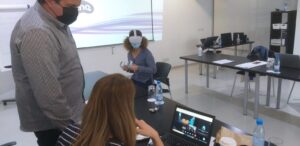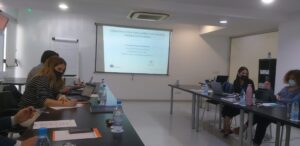On the basis of the National Agency agreement partners have exchanged undersigned documents on collaboration and there are no visible objections to transfer second 20% of money for the realisation of tasks by partners by the end of November (after receiving working time-sheets and partial reports).
After the evaluation of the submitted project experts have reduced per 100% costs for conducting IO1 activities explaining that such actions should be done before the project’s start. Although there were no money to finance it within IO1 direct costs our partnership managed to conduct some basic desk research and works on COViR Platform requirements (literature, technological stock, methodology, etc.).
- There is confirmation in the desk research results in the studies conducted by University of Maryland on VR learning retention positive effects. Thanks to VR learning pathways educational process is safer, controlled, customisable and risk-free learning environment (and it eliminates distractions) and reduces costs (you can have as many users as you want).
- What is worth to mention is rapid development of new VR training platforms observed in the period of last 3 months (since Kick-off meeting). Among new ones we can use Horizon workrooms (Facebook)m GLUE.work, MEETINVR.net, SPATIAL and other.
- There are two kinds of VR headsets HTC Vive and Oculus Quest 2 Standalone that are adequate for the COViR Platform. Partnership has agreed to buy Oculus 2 Standalone equipment.
- There is evaluation going on the COViR Platform’s assumptions regarding the:
- Consumption /retention of information (how well can users create the content and refer to info in the environment?)
- Production /efficiency of content creating (how well can users create content in the app?)
- Flow / ergonomy of us (how easy is it for users to engage and use of the environment?)
- Social /collaboration features (how well can users interact and work together in the app?)
- Value (total cost of the ownership relative to offering and other other similar solutions).
- Oculus Quest 2 Standalone headsets with sensors were tested by partners during the meeting (learning space and other exemplary apps).
Regarding IO3 EDITC presented a first overview on e-learning platform exposing huge experiences in the field of development of courses. Few exemplary are PV trainer, composition of methodology guides for trainers and mentors and on-line assessment tools (eqavet-outline.eu), I-Content.
As for IO4 CoViR certification scheme and assessment tools will be developed on the basis of CCC great experiences connected with different certification schemes and procedures (including ISO). Initially there has been said that examination of participants will be delivered via VR with questions of multiple choice – and will be also used to assess trainers. It seems that 60% of the validation question should be acceptable to be able to undertake second, practical part of the exam. Due to rapid technological changes it is predicted that all certifications given within COViR project trainings will be valid for the period of 3 or 5 years (maximum).
With regards to IO5 – preparation of COViR teachers guide is in its initial phase. There are some main assumption being developed such as the content that should include such components as:
- Training & development
- Learning outcomes
- Learner’s profiles
- The learning process
- Training programme
- Training support systems
- Classroom&communication-presentation skills
- Training methods
- Evaluation & assessment methods.
Guide should include solutions of Kirkpatrick’s method and John Spencers indications for distant learning (SAMR – substitution, augement, modification, redefinition).
